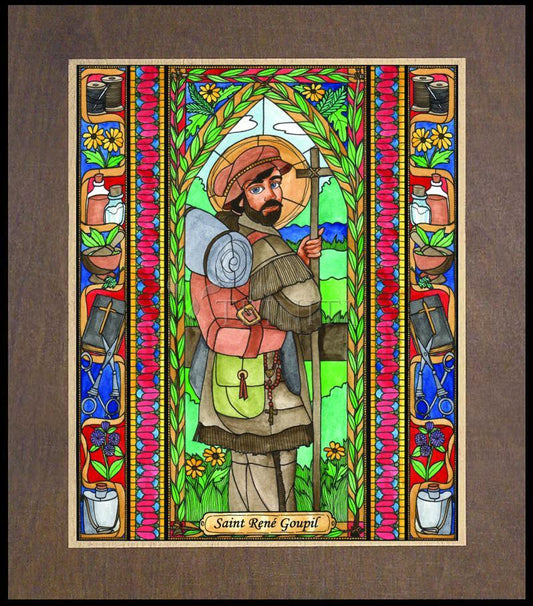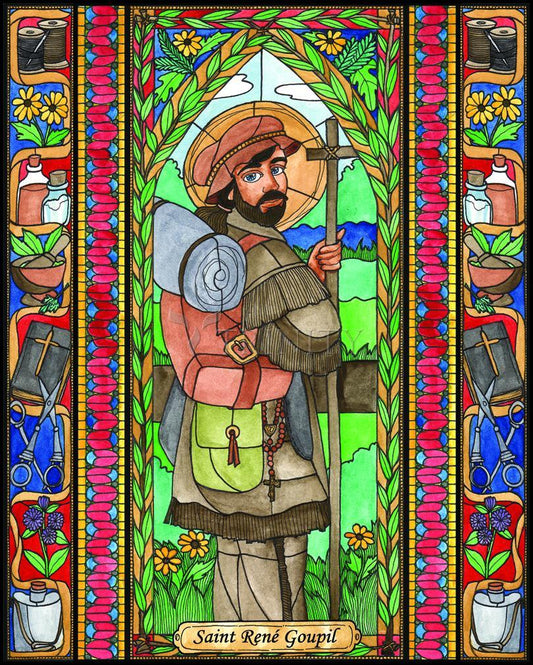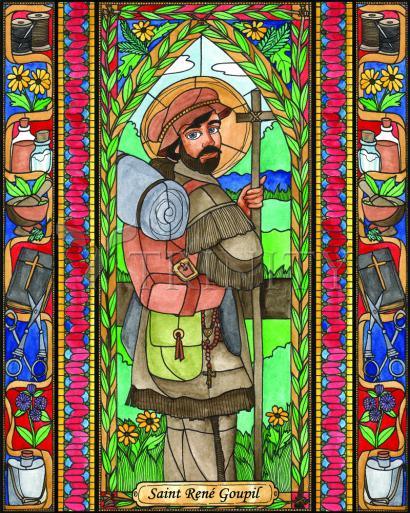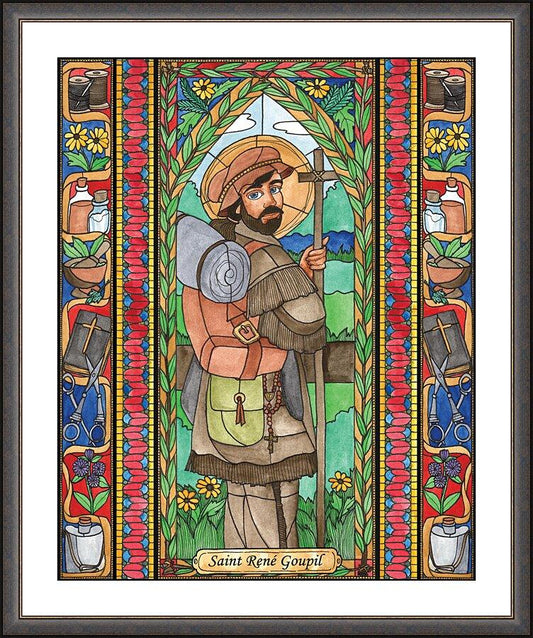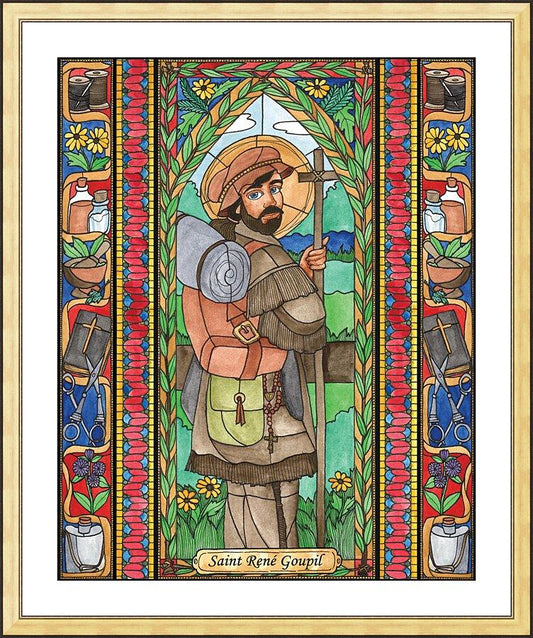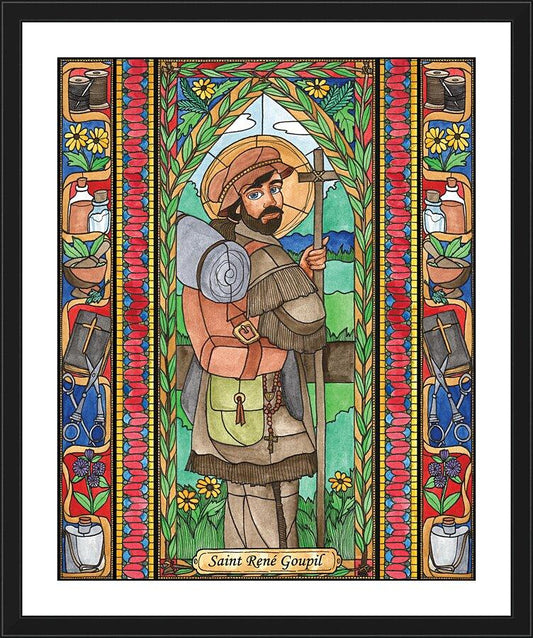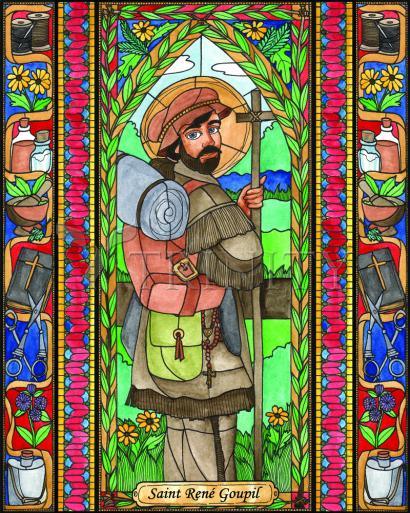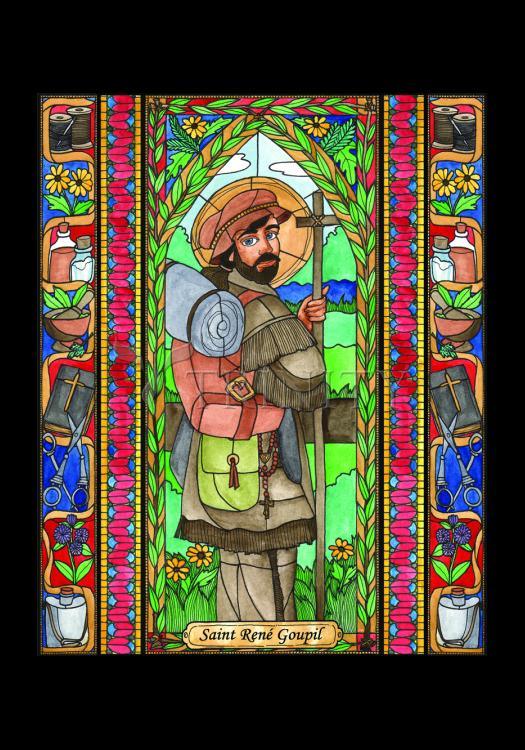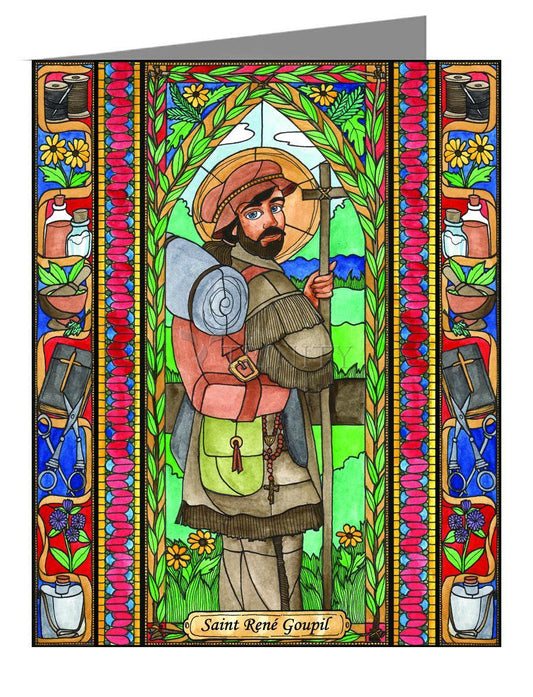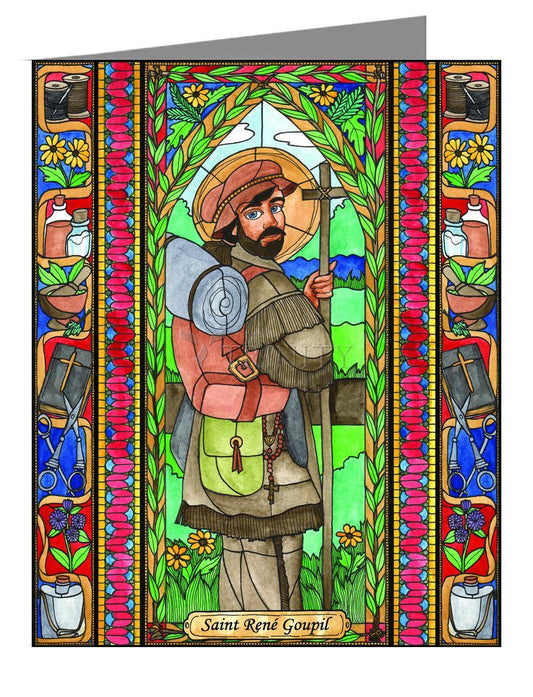Rene Goupil was from Angers. As a young man, having expressed a strong desire to enter the Jesuit novitiate in Paris, he spent several months there, much to the edification of all. However, his physical infirmities obliged him to abandon this vocation to the religious life.
But the idea of consecrating himself to the service of God remained with him, and, when he had recovered somewhat from his indispositions, he sailed off to New France to serve there the Society, which he was unable to serve in old France.
In order to avoid doing anything out of self-interest, although he was perfectly free to act as he pleased, he put himself completely into the hands of the Jesuit superior. The Father applied him for two years to the menial chores of the house, and these lowly offices Rene' fulfilled with much humility and charity.
He was also charged with caring for the sick and wounded at the hospital, a service, because of his natural aptitude for surgery, he rendered expertly as well as with loving care. For him it was a question of seeing our Lord in each patient. And thus he left a sweet odor of goodness and of other virtues in that place where his memory is still held in veneration.
ASSIGNED TO HURONIA
When we came down from Huronia in July 1642, we begged Father Vimont to allow Rene' to return with us. Our Hurons were badly in need of a surgeon. Father Vimont granted this request.
One cannot imagine the joy of this young man when Father Vimont told him to prepare for the voyage. Nevertheless, he was fully aware of the dangers to be met along the St. Lawrence, and he knew too the great hatred of the Iroquois for the French. All this, however, once the will of God for him had been declared, could not dissuade him from setting out for Three Rivers.
We left Three Rivers on August 1st, the day after the feast of Blessed Ignatius Loyola. On the 2nd, we met the enemy. Split up into two bands, they were waiting for us possessed of all the advantages that a large cohesive group fighting on land had over a small non-descript group caught on the water in an array of bark canoes.
IROQUOIS AMBUSH
Nearly all the Hurons fled into the woods, and we, being left behind, were taken prisoner. It was then that Rene's true worth shone forth. As soon as he was seized, he said to me: "Father, may God be praised; He has allowed this, He has wished it. May His holy will be done: I love it, I will it, I cherish and embrace it with all my heart."
While the enemy were pursuing those who had fled, I heard his confession and gave him absolution, not knowing what the future could have in store for us. When the enemy returned from the hunt, they flung themselves upon us like wild dogs with gaping jaws, tearing out our finger nails and crushing our fingers. Rene' bore all this with much patience and courage.
His presence of mind amid such distress showed itself in the way he helped me, despite his painful wounds, instruct as best he could those Hurons who were not Christians.
While I was instructing them separately and as I chanced upon them, he drew my attention to a poor old Huron, called Ondouterraon, indicating to me that he could well be one of those to be killed on the spot, since the Iroquois were wont to sacrifice some life at the height of their rage. So I quietly instructed this Huron while the enemy busied themselves with the distribution of the booty from the twelve canoes, some of which were laden with the goods destined for our Fathers in Huronia. Having shared the booty the Iroquois killed this poor old man just shortly after I had given him new life in the waters of baptism.
THE ROAD TO CAPTIVITY
We had the consolation in route of being together, and so I was witness to his many virtues.
On the way, he was always caught up in God. His words and various conversations reflected submission to the will of divine Providence and a ready acceptance of the death God would send. He gave himself up to God as a holocaust, ready to be reduced to ashes by the fires of the Iroquois which the hand of this good Father would ignite. He sought out every means to please God in everything and everywhere.
One day, after our capture and while we were in route to Mohawk country, he said to me: "Father, God has always given me an intense desire of consecrating myself to His service by religious vows in the Society of Jesus. Heretofore. my sins have always rendered me un-worthy of this grace. Nevertheless I hope that our Lord will find acceptable the offering which I wish to make to Him now by pronouncing, as best I can, the vows of the Society, in the presence of my God and before you." I readily assented, and he pronounced his vows with much devotion.
Badly wounded though he was, he cared for the other wounded, both the enemy who had been hurt in the fight and his fellow prisoners. He bled an ailing Iroquois with as much charity as he would have shown to the dearest of friends.
His humility and the obedience he yielded to his captors confounded me. The Iroquois who were conducting both of us in the same canoe bade me take up a paddle and ply it. I simply refused, being haughty and proud even in the face of death. A little later, they asked Rene' the same thing, and he, without demur, began paddling, and, since these Indians because of his example tried to pressure me to do the same, he, noticing this, begged my pardon.
During the trip I raised with him several times the possibility of his escape. The freedom we were allowed presented more than one occasion. I, for my part, could not leave the French and the twenty-four or twenty-five Huron prisoners. However, he never accepted the offer, preferring to leave everything to the will of our Lord who did not at all suggest that he flee.
TORTURE UPON TORTURE
On Lake Champlain we met two hundred Iroquois who came to the Richelieu when we began building the fort there. These overwhelmed us with blows, soaked us in our blood, and made us feel the wrath of men possessed by the devil. Rene' bore all these outrages and cruelties with great patience and charity towards those who were maltreating him.
Upon our arrival in the first village where we were treated with so much cruelty, he demonstrated a patience and a gentleness simply extraordinary. Having fallen under a hailstorm of blows heaped upon us with clubs and iron rods and not being able to get up he was carried half-dead to the scaffold where we had been placed in the middle of the village. But he was in such a piteous state that he would have moved even cruelty itself to compassion. His body was livid with bruises so that one could see in his face only the white of his eyes. Yet, for all that, he appeared the more beautiful in the eyes of the angels as he was more disfigured and like him of whom it is said: "We gazed upon him as on a leper"there was in him neither comeliness nor beauty" (Is. 53:4&2).
Scarcely had he, like us, got back his breath, when he was struck with three huge blows from a club, just as they had treated us earlier. After they had seized me as being the most prominent and had cut off my thumb, they turned on him and cut off his right thumb at the first joint, while he kept murmuring: "Jesus, Mary and Joseph."
For the six days we were exposed to all and sundry who wished to make sport of us, he showed forth an admirable gentleness. His chest was all burned by the hot coals and ashes which the young boys threw on our bodies during the night while we were fastened to the ground. Being by nature more agile than he I managed to avoid a number of these sufferings.
THE THREAT OF DEATH
After they had spared our lives when just a little earlier they had told us to get ready to die, Rene fell sick and developed a great aversion to everything and, in particular, to the food to which he was not accustomed. It is then that such words as these of Ovid apply: "Non cibus utilis aegro" (the sick man needs no food). I could not comfort him, being myself quite ill and having none of my fingers in decent shape. But now let me hurry on to speak of his death which lacked nothing to make it that of a martyr.
After being six weeks in that country, now that confusion reigned in the council of the Iroquois some of whom were for sending us back, we lost hope - not that I ever had much - of seeing again Three Rivers that year. Accordingly, we comforted each other by leaving all to God's will and we prepared ourselves for anything He might demand of us.
Rene did not fully comprehend the extent of the danger that faced us; I realized it better than he. And so I was often prompted to warn him that we should hold ourselves in readiness.
One day, while weighed down with our troubles, we had gone outside the village to pray more conveniently and with less distraction. Two young men came after us to say that we should return to the house. I had some premonition of what was going to happen and said to Rene: "My dear brother, let us commend ourselves to our Lord and our good mother the Virgin Mary. These fellows, I believe, are up to no good."
We had offered ourselves to our Lord a little earlier with much feeling, begging Him to accept our lives and our blood and to unite them to His own life and blood for the salvation of these poor people.
FELLED BY A TOMAHAWK
And so we turned back towards the village, reciting our rosary of which we had already said four decades. When we had stopped near the village gate to see what they would say to us, one of the Iroquois drew out a hatchet he had been hiding under a cover and struck Rene who was in front of him a blow on the head. Rene felt face down on the ground, uttering the holy name of Jesus (often we had encouraged each other to conclude our speech and our life with this holy name). At the blow, I turned and saw the bloodied hatchet and I knelt fully expecting a similar blow which would link me with my dear companion. But, since they held back, I got up and ran to the dying Rene who was quite near and whom they struck twice more on the head to finish him off - but not before I had given him absolution which in our captivity I had been giving him regularly after his confession every other day.
It was on the 29th of September, the feast of St. Michael, that this angel of innocence and martyr of Jesus Christ gave his life for Him who had given him His.
They then ordered me to return to my cabin where I awaited the rest of that day and the following day a similar fate. Indeed it was the belief of all around me that death would not be deferred for me now that those Iroquois had begun killing. And, to be sure, on several days they came to kill me, but our Lord did not allow it in different ways too long for me to explain.
ATTEMPTS AT BURIAL
The following morning, I could not restrain myself from going out to determine where they had thrown his blessed body, for I wished to bury it no matter what the cost. A few Iroquois who were anxious to save my life said to me: "You have no sense. You see that they are looking for you everywhere to kill you, and you still go out! You want to go and look for a half-corrupted body which they have dragged far from here. Do you not see these young men going out who will kill you if they catch you outside the palisade?"
But this did not stop me. Our Lord gave me enough courage to be willing to die in this office of charity. I went out, I searched, and, with the help of an Algonkin, captured long ago and now a true Iroquois, I found the body.
After Rene' had been killed, the children had stripped the body and dragged it by a cord attached to its neck to a stream which flows below their village. The dogs had already gnawed a part of his sides. I could not hold back my tears at the sight of him. I took the body and helped by my Algonkin I placed it beneath the water and weighted it down with stones so as to conceal it. I planned to return the next day with a spade when there would be no one around so as to dig a trench and bury him. I believed that the body was welt hidden, but perhaps some-one saw us, especially some youngster, and pulled it out.
The following day, when they were looking for me so as to kill me, my "aunt" sent me out to the field to escape their notice, so I believe. This forced me to put off the burial till the next day, and that night it rained so heavily that the stream filled up in extraordinary fashion.
The better to hide my intentions, I borrowed a spade from another cabin, but, when I reached the spot, there was no trace of the blessed remains. I went into the cold water and walked up and down, feeling with my foot to see if the stream had not lifted and dragged the body a bit - but to no avail.
How many tears did I shed, tears which fell into that rushing water, and I sang, as best I could, the psalms which the Church chants for the dead.
At length, after I had found nothing, a woman known to me passed by and saw me in distress. When I asked her if she knew what they had done with the body, she told me that they had dragged it to a river unknown to me about a mile distant.
FINAL OBSEQUIES
The woman's story proved untrue. The young people pulled the body out of the water and had dragged it into a little wood nearby. All that autumn and winter it became food for dog, crow and fox. In the spring, when I learned that they had dragged it there, I went to the wood several times but without finding the body. On the fourth trip I discovered the head and some half-eaten bones which I buried with the intention of taking them with me if the Iroquois would return me to Three Rivers, a thing they spoke of doing. I kissed these remains reverently several times since they were the bones of a martyr of Jesus Christ.
TRULY A MARTYR
I gave Rene' this title of martyr, not only because he had been killed by enemies of God and His Church, and also while engaged in obvious charity on behalf of his neighbor, placing himself in evident danger for the love of God; but, especially, because he had been killed for his prayers and the sign of the cross.
He had been living in a cabin where he had nearly always openly said his prayers. This did not please at all a superstitious old Iroquois who was there. One day, on seeing a little child of four years of age in the cabin, in an excess of devotion and love and with a simplicity we others - more wise in the ways of the flesh than he! - would not have practiced, he removed his head covering, placed it on the child's head and made a large sign of the cross over his body.
The old Iroquois, seeing this, ordered a young Iroquois in the cabin who was on the point of going on the warpath to kill Rene'. And the young man did just that, as we have explained.
The mother herself of this child, on a trip that I made in her company, told me that it was because of the sign of the cross that Rene' had been killed. And the old Iroquois who had given the order for his death, one day when he had called me into his cabin, said to me when he saw me blessing myself before eating: "There you have exactly what we hate! Now you know why they killed your companion and why they will kill you. Our neighbors the Dutch do not make this sign."
Sometimes too when I prayed on my knees, during a hunting expedition, they told me that they detested this way of acting, and that this was why they had killed the other Frenchman, and why they would kill me too when I got back to the village.
I beg your Reverence's pardon for the haste with which I have com-posed this account and for any lack of respect I may have been guilty of. Please excuse me. I was afraid I would miss the opportunity of acquitting myself of a duty which I should have attended to long ere now.
-Isaac Jogues. Sent to Jemme Lalemant, the Jesuit superior at Quebec, early May 1646



